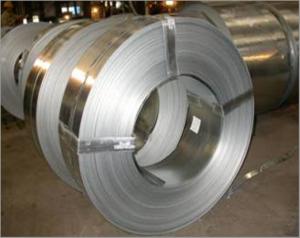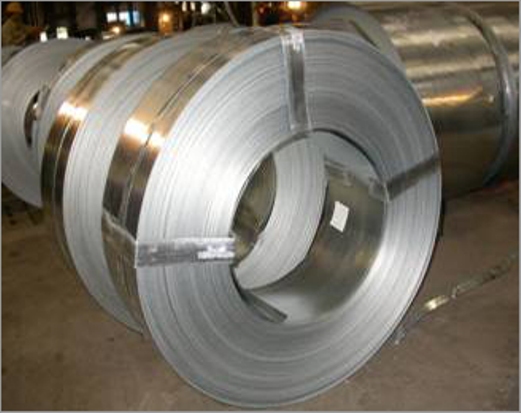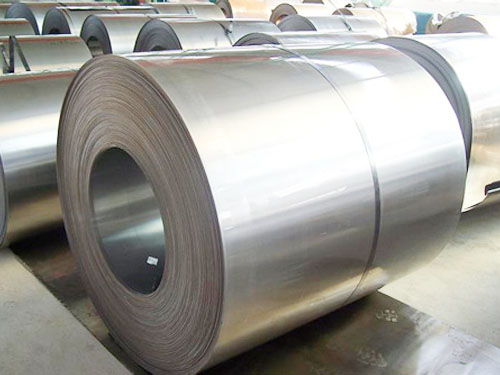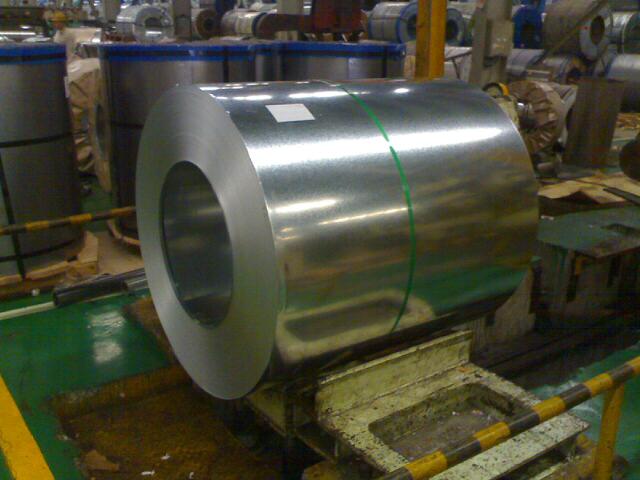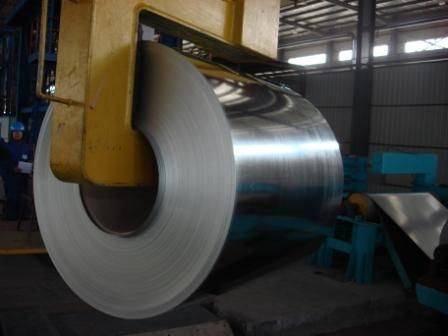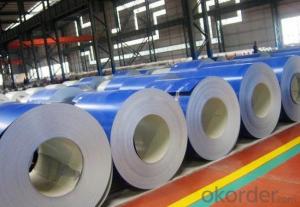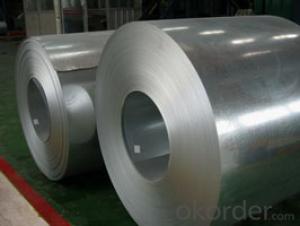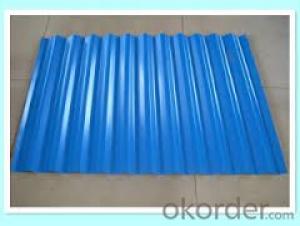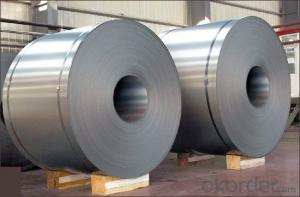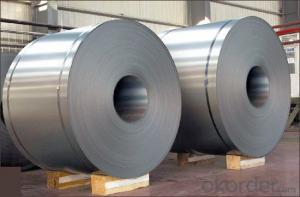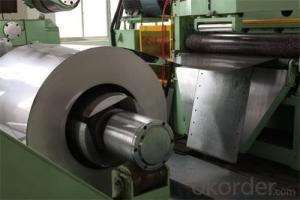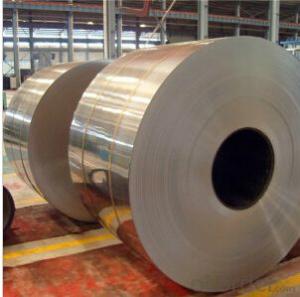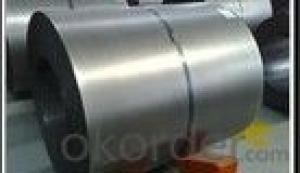Best Quality Cold Roll Zinc Glvanizing Steel Coil
- Loading Port:
- Qingdao
- Payment Terms:
- TT or LC
- Min Order Qty:
- 23 m.t.
- Supply Capability:
- 23 m.t./month
OKorder Service Pledge
OKorder Financial Service
You Might Also Like
1.Structure of Hot-Dip Galvanized Steel Sheet Description:
Hot-dip galvanized steel coils are available with a pure zinc coating through the hot-dip galvanizing process. It offers the economy, strength and formability of steel combined with the corrosion resistance of zinc. The hot-dip process is the process by which steel gets coated in layers of zinc to protect against rust. It is especially useful for countless outdoor and industrial applications. Production of cold formed corrugated sheets and profiles for roofing, cladding, decking, tiles, sandwich walls, rainwater protective systems, air conditioning duct as well as electrical appliances and engineering.
2.Main Features of the Hot-Dip Galvanized Steel Sheet:
• Excellent process capability
• Smooth and flat surface
• Workability, durability
• Excellent anticorrosive property
• High strength
• Good formability
• Good visual effect
3.Hot-Dip Galvanized Steel Sheet Images
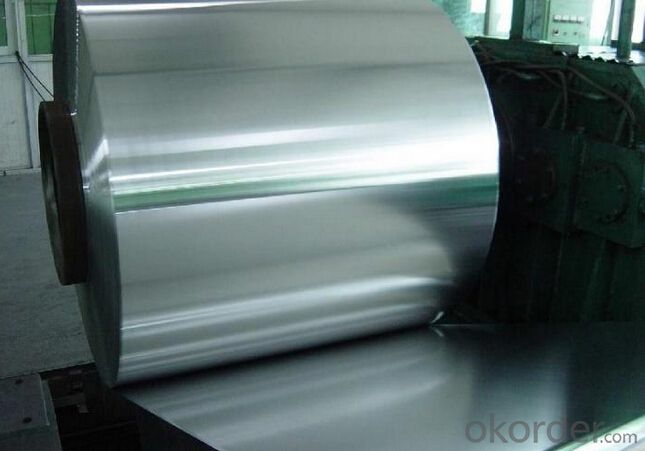
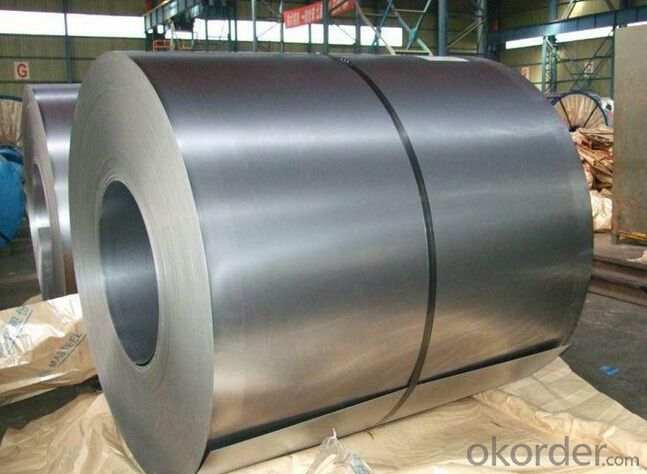
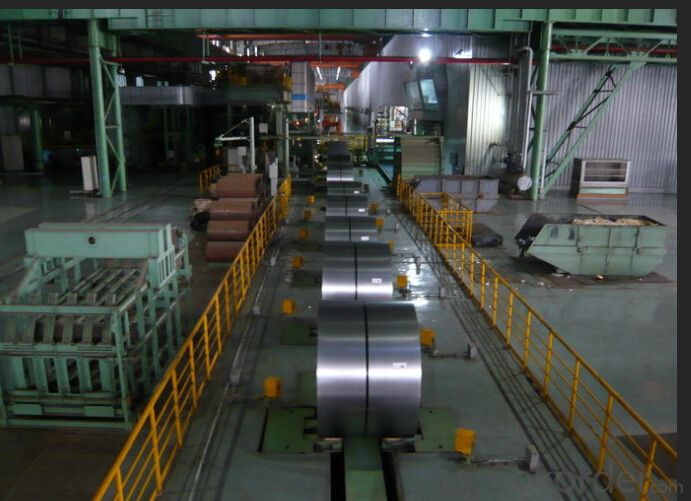
4.Hot-Dip Galvanized Steel Sheet Specification
Standard: ASTM, JIS,EN
Grade: CS, DX51D+Z,SGCC, SS 230~550,S220GD+Z~S550GD+Z, SGC340~SGC570
Thickness: 0.1mm~5mm
Width: max 2000mm
Coil weight:3-12 MT
Coil ID:508/610mm
Surface structure: zero spangle, regular spangle or minimum spangle
Surface treatment: Chromate treatment, Oiled/dry, skinpassed/non-skinpassed
Packing: Standard seaworthy export package
Technology test results:
| Commodity | Hot dip galvanized steel coil and sheet |
| Techinical Standard: | JIS 3302 / ASTM A653 / EN10143 |
| Grade | DX51D / DX52D/ DX53D/ S250,280,320GD |
| Types: | Commercial / Drawing / Deep Drawing / Structural quality |
| Width | 500/650/726/820/914/1000/1200/1219/1220/1250mm |
| Thickness | 0.14-3.0mm (0.14-0.5mm is the most advantage thickness) |
| Type of coating: | galvanized |
| Zinc coating | Z30-275g/m2 |
| Surface treament | chromed / skinpass/ oiled/slightly oiled/ dry/ anti-fingerprint |
| Surface structure: | zero spangle / minimized spangle / regular spangle/ big spangle |
| ID coil | 508mm or 610mm |
| Coil weight | 3-8 MT per coil |
| Package: | Properly packed for ocean freight exportation in 20''containers |
| Application: | Industrial panels, roofing and siding for painting |
| Price terms | FOB,CFR,CIF |
| Payment terms | 30%TT in advance+70% TT or irrevocable 70%L/C at sight |
| delivery time | 15-20 days after recepit of 30% TT |
| Remarks | Insurance is all risks |
| MTC will be handed on with shipping documents | |
| We accept the third party certificatation test |
5.FAQ of Hot-Dip Galvanized Steel Sheet
We have organized several common questions for our clients,may help you sincerely:
1.How about your company?
A world class manufacturer & supplier of castings forging in carbon steel and alloy steel,is one of the large-scale professional investment casting production bases in China,consisting of both casting foundry forging and machining factory. Annually more than 8000 tons Precision casting and forging parts are exported to markets in Europe,America and Japan. OEM casting and forging service available according to customer’s requirements.
2.How to guarantee the quality of the products?
We have established the international advanced quality management system,every link from raw material to final product we have strict quality test;We resolutely put an end to unqualified products flowing into the market. At the same time, we will provide necessary follow-up service assurance.
3. How long can we receive the product after purchase?
Usually within thirty working days after receiving buyer’s advance payment or LC. We will arrange the factory manufacturing as soon as possible. The cargo readiness usually takes 15-30 days, but the shipment will depend on the vessel situation.
- Q: Are steel coils affected by magnetic fields?
- Yes, steel coils can be affected by magnetic fields. Steel is a ferromagnetic material, which means it can be magnetized or attracted to magnets. When a magnetic field is applied to a steel coil, it can induce a magnetic field within the coil, causing the coil to become magnetized. This can have several effects depending on the strength and duration of the magnetic field. If the magnetic field is strong and the coil is exposed to it for a significant amount of time, it can cause the steel coil to retain some magnetism even after the magnetic field is removed. This can be problematic in certain applications where a non-magnetic material is required, as the magnetized steel coil may attract or interfere with other nearby objects. On the other hand, if the magnetic field is rapidly changing or fluctuating, it can induce electrical currents within the steel coil through electromagnetic induction. These induced currents, known as eddy currents, can generate heat within the coil, leading to energy losses and potential damage to the coil. Therefore, it is important to consider the effects of magnetic fields on steel coils in various applications. Protective measures such as shielding or demagnetizing processes may be necessary to minimize the impact of magnetic fields on steel coils when required.
- Q: why does steel have a density range when other metals do not?
- Steel is not a pure element it is an alloy. Steel is primarily iron but it has many elements blended in that change it's density including carbon,silicon, nickel, chrome, etc. Aluminum and copper , magnesium and so forth can be the pure element or they can be alloys too. If they are alloys, then their densities vary also
- Q: What are the different types of steel coil slitting methods?
- There are several different types of steel coil slitting methods, including rotary shear, loop slitting, and oscillating shear. Each method has its own advantages and is used for different applications in the steel industry.
- Q: PLS tell me all Foam Steel Characteristics and use?Thanks
- Foam steel [often steel foam] is used in applications that require light weight but high rigidity and strength. Watertight doors on modern ships are often made of foam steel. Pressure doors on aircraft are possible uses. As we keep striving for lighter weights in cars, foam steel might have some useful applications in bodies. There is a technical paper online that is in .pdf format that has a good discussion of the process and characteristics of foam steel.
- Q: What are the common coil transportation options?
- The common coil transportation options include trucking, rail transport, and sea freight.
- Q: What are the different types of coatings applied to steel coils?
- Steel coils can be coated with a variety of coatings, each serving a specific purpose and offering unique advantages. 1. Galvanized Coating: Among the most frequently used coatings for steel coils is the galvanized coating, which entails the application of a layer of zinc to the steel surface. Galvanized coatings offer exceptional corrosion resistance, making them ideal for outdoor applications where the steel may come into contact with moisture or harsh environmental conditions. 2. Galvalume Coating: Similar to galvanized coating, galvalume coating also involves the application of a zinc layer to the steel surface. However, it incorporates a small amount of aluminum as well. This addition enhances the coating's corrosion resistance and improves heat reflectivity. Galvalume coatings are commonly employed in roofing and cladding applications. 3. Pre-painted Coating: Pre-painted coatings encompass the application of a layer of paint or primer to the steel surface. This type of coating allows for customization in terms of color and finish. Pre-painted coatings not only enhance the steel's aesthetic appeal but also provide added protection against corrosion and weathering. 4. Organic Coating: Organic coatings are typically applied as a topcoat over galvanized or galvalume coatings. They are composed of various resins, such as polyester, epoxy, or polyurethane, which offer additional protection against corrosion, abrasion, and chemicals. Organic coatings are frequently utilized in industries that prioritize both durability and aesthetics, such as the automotive sector. 5. Metallic Coating: Metallic coatings, such as aluminum or zinc, are applied to steel coils using the hot-dip coating process. These coatings deliver exceptional corrosion resistance and are commonly used in applications where the steel is exposed to high temperatures or corrosive environments. 6. Chromate Conversion Coating: Chromate conversion coatings are primarily applied to steel coils for their corrosion resistance properties. They are frequently employed in electrical applications to safeguard against galvanic corrosion and enhance conductivity. Ultimately, the choice of coating for steel coils is contingent upon specific application requirements, including the desired level of corrosion resistance, aesthetic considerations, and environmental factors.
- Q: How are steel coils cut into smaller sizes?
- Steel coils are cut into smaller sizes using a machine called a slitting line. This machine employs a set of circular blades that cut through the steel coil, creating narrower strips or sheets of the desired size. The slitting line can adjust the width of the cuts and can also remove any rough edges or burrs.
- Q: What are the different coil cutting machine options available for steel coils?
- Steel coils can be cut using various machines, each designed to meet different needs and specifications. The available options are as follows: 1. Slitting Machine: This machine slices large steel coils into narrower strips or slits. It incorporates a circular blade that moves across the coil's width, cutting it into desired widths. Industries like automotive, construction, and manufacturing commonly use slitting machines due to their ability to handle a wide range of steel coil thicknesses. 2. Cut-to-Length Machine: This machine is used to cut steel coils into specific lengths. Equipped with a shearing mechanism, it cuts the coil based on programmed length requirements. Cut-to-length machines are particularly beneficial when precise and consistent lengths are necessary, for instance, in the production of steel sheets or plates. 3. Rotary Shear Machine: Designed to cut steel coils into smaller pieces or squares, this machine employs a rotating drum with multiple cutting blades. It shears the coil in a continuous process, making it suitable for industries that require smaller steel pieces for further processing or assembly. 4. Guillotine Shear Machine: Equipped with a vertically moving large blade, this machine is used for high-speed and high-precision cutting of steel coils. It is commonly employed in heavy-duty industries like shipbuilding and metal fabrication, as it can handle thicker steel coils. 5. Laser Cutting Machine: Laser cutting machines provide a highly precise and versatile method for cutting steel coils. By using a focused laser beam to melt or vaporize the material, they ensure clean and accurate cuts. Laser cutting machines are suitable for a wide range of steel coil thicknesses and can handle complex shapes and patterns. These examples illustrate the available options for cutting steel coils. The choice of machine depends on factors such as coil thickness, required cutting precision, desired output volume, and specific application requirements.
- Q: How are steel coils inspected for camber?
- To ensure the quality and suitability of steel coils for further processing, various methods are employed to inspect their camber. One commonly used approach is visual inspection, where trained inspectors carefully examine the coils for any visible indications of camber. They search for any deviations from a perfectly straight surface, such as bows or curves, which serve as signs of camber. Another method involves the use of specialized equipment, including straightedges, measuring tapes, and laser devices. Inspectors place the straightedge along the length of the coil to assess any gaps or spaces between the coil and the straightedge. If a significant deviation is detected, it signifies the presence of camber. Measuring tapes are also utilized to measure the distance between the coil and the straightedge at multiple points along its length. This enables inspectors to ascertain the extent of camber and determine if it falls within acceptable tolerance limits. In some cases, laser devices are employed to provide a more precise measurement of camber. These devices emit a laser beam that reflects off the surface of the coil and is subsequently analyzed to determine the presence and magnitude of camber. Furthermore, advanced technologies such as computer vision systems and artificial intelligence algorithms are now being integrated into the inspection process. These technologies have the capability to analyze images or videos of the steel coils and automatically detect any camber, thereby delivering accurate and efficient inspection results. In conclusion, the inspection of steel coils for camber involves a comprehensive approach that combines visual inspection, manual measurements using straightedges and measuring tapes, and the utilization of advanced technologies. This multifaceted approach ensures effective detection and control of camber, thereby upholding the quality and integrity of the steel coils.
- Q: which cost more: ALLOY, GUNMENTAL OR STAINLESS STEEL. GIVE ME AN IDEA OF THE COST OF EACH.
- Titanium alloy is. Its the hardest metal in the world and takes about 6 months to produce. I sell titanium juliets for 350.
Send your message to us
Best Quality Cold Roll Zinc Glvanizing Steel Coil
- Loading Port:
- Qingdao
- Payment Terms:
- TT or LC
- Min Order Qty:
- 23 m.t.
- Supply Capability:
- 23 m.t./month
OKorder Service Pledge
OKorder Financial Service
Similar products
Hot products
Hot Searches
Related keywords
